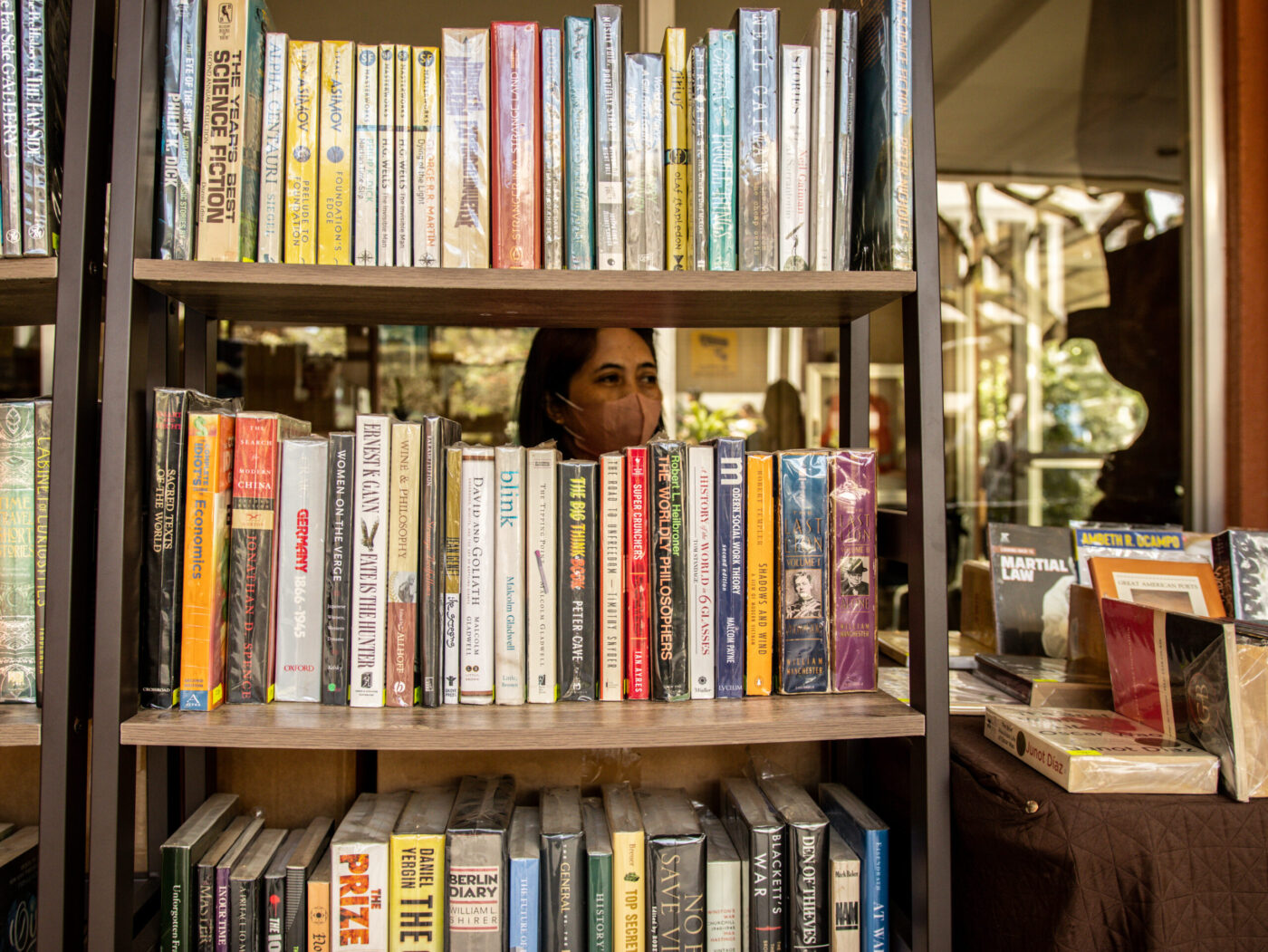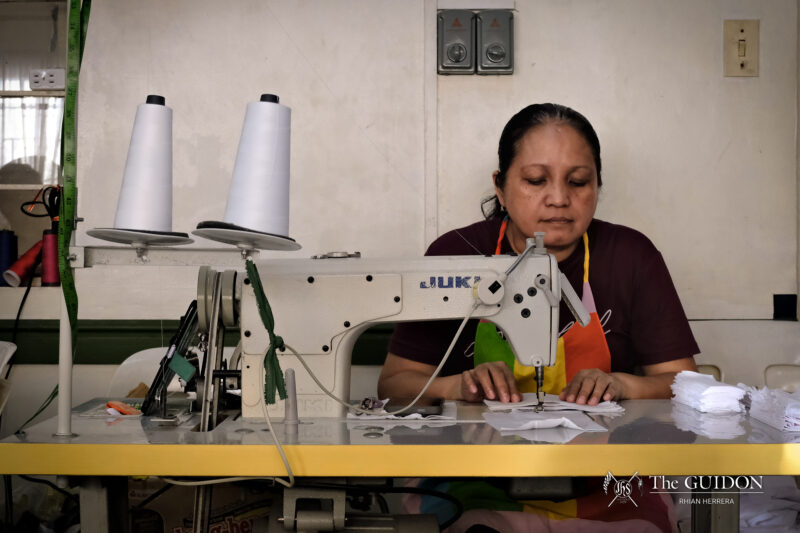As passersby rush to their destinations, a lady uncovers the tarpaulin hiding the books from the night before. Minding her own business, she waits for new stories to share.
EVERY DAY, Ate Nedra* sits next to Horacio de la Costa Hall’s entrance, shielded from the sunlight by the building’s overhang. The shelves surrounding her contain the stories she guards until they find their real homes. After all, these tales were never quite hers to begin with as the saleswoman for the Zeitgeist Bookshop’s permanent stall on the Ateneo campus.
From behind two perpendicular shelves and a table filled with clear plastic-wrapped books, the woman watches students, faculty, and staff pass, rushing to their campus destinations. She never shouts at them to come toward the stall. Instead, she silently waits for someone to break away from the crowd to window-shop or buy their next read.
Browsing the stacks
Edwel Florido (3 AB LIT (ENG)) frequently stops by the de la Costa book sale, a name for the stall that most members of the Ateneo community use. In the many times that he has scoured the shelves, he has only bought two books so far.
The first book Florido bought from the sale was Lewis Carroll’s Alice’s Adventures in Wonderland (1865), which he did not expect to find for sale on University grounds. His delight grew when he saw that it only cost about Php 250, instead of the usual Php 400-range.
“When it comes to bookstores in Ateneo, you would expect, usually, literary fiction or novels rather than children’s literature, especially since, well, you’re kind of expected to be beyond those reading levels,” he explains.
Noting the diversity and affordability of the books in the stall, Florido feels more comfortable deeming the Ateneo campus a safe space: Knowing people purchase or browse in the de la Costa book sale helps him realize that there are people who share his interests—that he has a community he belongs in.
For Florido, Ate Nedra herself also contributes to this warm and heartfelt perspective. One interaction that cemented this to Florido was when he found The Fairy Bible (2008) by Teresa Moorey.
After the title caught his eye, Florido pulled the book out from the shelf then turned it over to read its synopsis. At that moment, he still could not picture whether the book’s story was interesting enough to splurge on, so he shyly asked Ate Nedra if she could remove it from the plastic.
To his delight, she agreed. He watched as her fingernails scraped against the jagged-edged scotch tapes that kept the fantastical world of fairies covered in plastic. Once the book was unwrapped, Florido was enamored with beautifully-drawn depictions of the multiple fae and thoughtfully-written descriptions of them.
While Florido was unable to purchase the book at the time, Ate Nedra’s willingness to remove the plastic cover from The Fairy Bible reassured him that he did not have to be nervous at the stall. “It was a very light feeling that this kind lady would really open the plastic just so I could read a book,” he describes in a mixture of Filipino and English.
In doing this, she made him feel welcomed at the de la Costa book sale.
A uniquely portable magic
Boasting narratives both old and new, book sales and stores naturally evoke a sense of magic. The air around such places is inherently calmer and charged with curiosity, but Florido emphasizes that this sense of wonder and comfort also comes from the people in charge of them.
Ate Nedra always quietly greets him “good morning” or “good afternoon,” which makes him feel invited to browse through the books in the stand.
She and Florido never exchange words beyond these polite greetings or a shy inquiry about the stall’s stock. His visits end when he nods at her, a voiceless thanks for accommodating him. Such short and simple interactions suffice between them, as Florido notes that her kindness shines through even without her saying much. It is what motivates him to keep coming back.
To him, the book sale would not be the same without her there. However, despite Florido’s many encounters with Ate Nedra, he still does not know her name.
Behind the silent saleslady
Accustomed to passersby, Ate Nedra patiently accommodates potential book buyers and window shoppers like Florido as they browse through the diverse selection of both brand new and pre-loved books.
Ate Nedra’s routine usually consists of waking up early in the morning and maneuvering the streets of Barangay Pansol, often traversing the bustling stretches of Katipunan in order to reach Ateneo. In the morning’s silence, she uncovers the tarpaulin from yesterday’s closing and cleans the bookshelves as well as its surrounding area. From time to time, she checks up on the inventory if there were any books that were found to be missing or low in stock.
In her spare time, she likes to read Filipino authors such as Lualhati Bautista. One of her favorite books from the author is Bata, Bata… Pa’no Ka Ginawa (1988) because of its coherent and meaningful writing style. In some instances, after a long day of work, she buys books from the stall and brings them back home to enjoy. When she really has nothing to do, she would often find herself rummaging through whatever books she can find in the book sale. However, due to the stall’s limited Filipiniana selection, she often stumbles upon books written in English instead.
Before her work at the de la Costa book stall, Ate Nedra came from a family of farmers that resided in South Cotabato. Originally, she was a cashier for a fertilizer company, but eventually left for Manila in search of better conditions and job opportunities, leaving her mother and her child behind.
Ate Nedra usually goes back home every two years to visit her mother and her daughter. She sees her child’s growth only at intervals at a time, while eventually missing some childhood milestones along the way. “Hindi ko [na] siya mabantayan sa paglaki niya, pero kailangan [kong magtrabaho] (I won’t be able to take care of her anymore as she grows older, because I need to work),” she shares.
Bounded by the books
Unaware of the positive impacts the book sale brings to the Ateneo community, Ate Nedra works to support her family and keep herself busy—an everyday activity she prefers more than just staying at home. “Wala naman akong ginagawa sa bahay; ‘yung para lang […] [may] pagkaabalahan lang ako (I don’t really do anything at home; I work so that I have something to do),” she expounds shyly.
However, to Florido and many other Atenean bookworms, the book sale is a safe haven to browse the selection of stories in silence, while enjoying the cool shade against the sweltering heat of the sun.
As these strangers wonder if the book they chose is worth buying, Ate Nedra sits comfortably in her corner, not knowing anyone by name but hopefully by face, waiting for a simple transaction to take place.
When these book lovers eventually leave for their busy everyday lives that are just as teeming as the roads of Katipunan, the small smiles and simple greetings that passersby like Florido share with Ate Nedra are just enough to bind them momentarily together.
*Editor’s Note: The interviewee’s name has been changed at their request to protect her identity and privacy.







